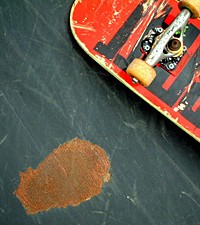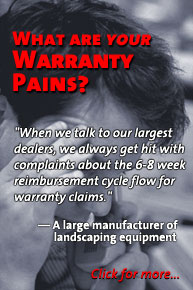February 24, 2004 |
ISSN 1550-9214 |
Skatepark Warranties:Whether they're made of steel, plywood, plastic, or paper, the ramps and rails installed in skateboard parks are sold with a warranty. But whether the warranty lasts for a year or 20 years seems to have more to do with marketing than the strength of the materials used.
How do they do it? One gets the feeling that it's a mixture of perspiration, inspiration, and competition. That is, it's perspiration in that they know how to weld and cut and construct a framework that will last decades, not unlike the way all those small trailer manufacturers in the Midwest crank out their products one at a time. It's inspiration because they believe that warranty claims will never amount to much, and therefore will require no accruals or reserves. It's competition because these marketing departments roll out the 15- or 20-year warranties simply because everyone else is doing it, not because there's any evidence the product will last that long. One of these days, some startup is going to slap their skatepark with a lifetime warranty. Manufacturers in industries such as automotive and heating/ventilation/air conditioning tend to plan for the long term, and to keep their predictions and estimations on the conservative side. While Ford, Harley and Daimler are names that have been around a hundred years or more, some HVAC manufacturers can trace their roots back even further to the 1800s -- York International in 1884, Trane in 1885, and Lennox International in 1895. They've been bending, stamping, molding, and welding metal for generations, so they have plenty of historical data to back up their longish warranties. And they accrue for warranties as they're issued, so at least theoretically the money has already been put aside to pay future claims by the time the product is put to use. Every quarter, their chief financial officers tells shareholders they are maintaining what they believe are adequate reserves, adjusted constantly. The situation in the skatepark industry is precisely the opposite. The oldest skatepark manufacturers can trace their roots back to the early 1980s at best, but most have opened their shops since 1998. They're also bending and welding steel, and some of it may very well last for decades. Then again, because it's basically getting jumped on by teenagers all day, maybe these ramps and rails won't last as long as bridges and boilers. Yet some skatepark companies are issuing long-term warranties on products for which they have little or no historical claims data. Two Warranty ExtremesThere seem to be two extremes of warranties in the skatepark business: 1) lengthy and exclusionary, and 2) short but comprehensive. Those who provide the 15- or 20-year warranties make sure to load them up with a list of items not covered and a list of actions that void the whole policy. Some don't include the cost of labor, or shipping -- which for a one ton steel box can be prohibitively expensive. Others try to pass off obvious defects as vandalism, making it difficult to collect on a claim. Some try to keep the customer happy by letting questionable claims go through, but one wonders how accommodative they'll be in five or ten more years, when the borderline claims really start to roll in. Meanwhile, those who provide the one- or two-year policies will fix almost anything early on, but they expect the skatepark operators to gradually learn how to maintain things themselves. They want to fix any defects caused by manufacture and/or installation, but then the customer is on their own. Like automobile manufacturers, they expect their products to wear out in a decade or two, and to require constant maintenance. But the warranty stays short. The length of warranties also seems to depend on the materials used, with steel and aluminum towards the long end of the scale, paper and plastic towards the short end, and wood somewhere in the middle. Some of this is based on university lab tests, but some of it is nothing more than one-upsmanship marketing. Besides there being no warranty reserves, there's also no third party insurance, so these warranties will not outlast their issuers. Skatepark customers for the most part are municipalities paying between $100,000 and $250,000 for the typical skatepark, which more often than not is taking the place of some aging pool or ball court in a city park. The users are local "skater boys" and a few girls, typical ages 10 to 20. Industry figures suggest there are 16 million skaters in the U.S. alone, but three-quarters identify themselves as "street skaters" who use existing picnic tables, guardrails, municipal fountains, pools, curbs, and stairs as their obstacle courses. That frequently brings them into conflict with local business owners as well as the police. Plenty of Growth Prospects AheadSkatepark manufacturing is a growth industry at the very bottom of its S-curve. There are only 2,000 to 2,500 skateparks in the world, as compared to hundreds of thousands of playgrounds. A top skatepark manufacturer would have several hundred installations to its credit. The top playground manufacturer claims 50,000 installations. Initially, the field was dominated by entrepreneurial skaters who knew how to handle a power saw and a blowtorch -- do-it-yourself backyard and garage-based artisans who made ramps and rails for their friends out of wood or steel. They tend to be small companies that do business within a day's drive of headquarters, making installations and service calls easier. In the past few years, however, some of the established national playground manufacturers have jumped into the market, leveraging their parks department contacts and distribution networks to produce skatepark contracts.
Built to LastIt's becoming difficult for the small skater companies to compete with the big corporations, but it's still not impossible. One way of competing is to build tough products and then back them with really long warranties. The American Ramp Company of Joplin, Missouri stakes its reputation on an all-steel product that will last decades, as long as skatepark owners do their part to keep them painted and rust-free. There's no plastic parts, no wood, just steel from the top of the ramp to the asphalt. Jim Moss, ARC's operations manager, said the product is built to last. It better be. The warranty is 20 years. "The gauge of steel we use -- 3/16-ths-inch plate steel -- that would be the same gauge used for bulldozer buckets," he said. "We have quarter-inch plate steel ribs placed every two feet under the ramps. We have done engineering tests as far live loads, point loads, and things like that. The steel is just made to last that long." The company has a Flash demo on its Web site which shows the shape and size of the blue and silver ramps, the rails, and some customer comments. They also run a Flash-based "design your own skatepark" online application, though it requires the user to reveal contact names and budgets before beginning the design. "We have a 20-year warranty on that product line, and it covers everything except cosmetics," Moss said. The customer should expect that constant riding will wear off the blue and silver powder coating, especially on the rails, and they must must do the repainting themselves. That is normal wear and tear, and is not covered by warranty. Then again, there are instances where within the first year the powder flakes off the steel in non-riding areas, and possibly starts rusting through in patches. That would be seen as a defect in the powder coating, and would be a valid warranty claim, Moss said. ARC has been in business since 1998. It's cranking out skateparks at a rate of around 100 per year, with most going to municipalities but an increasing percentage going to US Air Force bases and other federal customers. The company makes skateparks only -- no playgrounds or other lines of business. Moss said that once a claim is established to be valid (i.e. not caused by vandalism, neglect, or normal wear and tear), ARC will either ship out a new part or send out a technician to install it. The goal is always to keep the customer happy, so they'll tell people in the next town or the next military base how happy they are. "That's not just a park we've sold. That's a reference," he said. "It's important to us that they're happy, because this early in the game, it's not like every town has a skatepark." Good word of mouth among both skaters and city planners is priceless. Heat and Noise ComplaintsAll-steel construction has one big problem, however: summer sun. Think about lying on a car hood in the middle of a summer afternoon. Things get hot in all-steel skateparks. They're also much noisier than skateparks covered in wood, plastic, or other surfaces. Concrete is as durable and much quieter, but also is much more expensive. All-steel manufacturers are, however, finding ways to cut the noise by adding sound insulation to the underside of the ramps, and to cut the heat by using special cooling paints on the top side.
The manufacturer of Skatelite Pro, however, told Warranty Week that different skatepark makers are given warranties of different lengths. Matt LaCross, warranty manager with the Richlite Company of Tacoma, Washington said the company will extend a warranty of between two and five years to the builder of the park. "Some of the builders construct parks better than others, and so we offer a longer warranty to the builders who have a better track record constructing parks," he said. "The material will last longer than the warranty, but we have to have some sort of cut off as far as a warranty goes." Richlite also makes countertops and paper-based food preparation surfaces, as well as some of the composite materials used to construct and repair Boston Whaler pleasure boats. It sells Skatelite Pro in sheets to the skatepark manufacturers, which they then attach to the wood or steel layer underneath. As it wears out after years of use, the old sheets are peeled up and the new sheets are installed. The warranty on Skatelite Pro specifically covers manufacturing defects and specifically excludes damage caused by abuse or normal wear and tear. So if the Skatelite layer peels up and becomes a hazard, it's covered. But if it's chipped or gouged, spray painted, burned or otherwise abused, it's not covered. Warranty managers contacted by Warranty Week say they can tell the difference just by looking at a photograph, which is how most claims are initially handled. However, none of these warranties seem to quantify what would be "normal" wear and tear. So a skatepark used by 500 people a week might see its Skatelite Pro surface wear out in a year or two while another with 500 users a year might see it through five years or even longer. It's like selling an automobile with a warranty that lasts for years but takes no note of mileage, except in this case it's the road that's covered. However, since the warranties do not cover wear and tear under any circumstances, all any usage metrics would do is prevent misunderstandings about how soon a park will be due for normal resurfacing. Design Testing and Materials ResearchDuluth, a city of roughly 87,000 people at the western tip of Lake Superior, is a busy seaport for Great Lakes freighters loaded with iron, coal, and stone. Duluth also is a university town with a central role in the skatepark industry. Not only is it the home of the University of Minnesota Duluth and its Natural Resources Research Institute, but also to skatepark equipment makers such as SunRamp Solutions Inc. and TrueRide Inc. It's no accident. SunRamp turned to engineers and wood scientists at the NRRI for help with product design and testing in extremes of heat, cold, and moisture. TrueRide was started by university alumni, and in fact NRRI has been working with them for several years now on materials testing, design, and manufacturing. SunRamp is a pioneer of the market for portable skating ramps that can be moved around to some extent by a parks department crew. Gerald Sabol, SunRamp's CEO, said he started the company in 1998 after getting sick and tired of his desk job following a merger. He immediately turned to the university's NRRI for advice, and with their help he had a product on the market by 1999. SunRamp's products are made of one-inch-thick molded plywood with a plastic coating to dampen noise and improve weathering. They use recycled rubber components on the ground, the so-called "SunRamp Transition Boots" between the ramp and pavement. Over the course of its five years in the business, Sabol said SunRamp has sold a couple of thousand ramps in the commercial market and has adjusted warranty claims on only four or five. Therefore, his confidence in the product's durability is increasing with experience, and so is the length of its warranties. Initially, two years in length, the warranties are now going up to five years. Last year, SunRamp debuted a $250 backyard ramp product line aimed at consumers, for which the warranty term is once again starting at two years. "The reason I'm a little hesitant is because I'm a small company and I don't want to stick my neck out too far. So I give it that two-year window, knowing I can get there," Sabol said. The Home Xtreme Series came out only last October, so he said he doesn't want to risk imposing longer-term liabilities on the company until he has more data. "On our commercial side, we're going up to five-year warranties," Sabol said. "We build that a little differently than our home product series. Home Xtreme is not designed to be as strong as our parks department ramps." Thanks to years of product testing, he knows the commercial ramps will last at least that long. "We've sat stuff outside here for four or five years in our weather, so I've actually seen my products survive five years," he said. "I needed to prove to myself that the product would last."
SunRamp has found a niche among overseas U.S. military bases, where the ramps are used by the children of soldiers and sailors. Portability and low price are what initially sells the ramps, but durability is what produces the repeat business and the referrals. Sabol said a few years ago, SunRamp sold ramps and rails to one base in Italy, and then to another in Spain when some of the personnel were reassigned there. Sabol said he wants to keep them happy. "The military is a very tight-knit group that talks over the fence, if you will. If one was unhappy, they'd all hear about it," he said. Conversely, if they're happy, SunRamp gets the referral business. Last week, the company shipped off a skatepark to a U.S. base in the Azores. The "Real Warranty" CompanyNestled between these two extremes of two-year and 20-year warranties is TrueRamp, which sells a steel-and-Skatelite product line that carries a 10-year warranty on the structure and five years on the surface. But what makes TrueRide different is the level of service that goes along with that warranty, according to project manager Dustin Elbing. He said the company actually sends crews out to visit all its parks to see if anything needs adjusting or replacement. "We make sure the maintenance is perfect," Elbing said. "We don't expect you to touch your park. We have three road crews that travel around continuously all year long. Whenever they're in an area where we have an existing park, they stop by and look through it." TrueRide's ramps uses ¼-inch Skatelite Pro surfaces on top of ¾-inch FlexCore sheets, which is a cooler, quieter, and more flexible combination than steel alone. They're also less durable than all-steel ramps. But all the safety and grind rails are made of galvanized steel, as are all the ramp edges, fasteners, bolts, and nuts. The thresholds between the ramp and asphalt are made of 3/16th-inch, 8-gauge galvanized steel. The beams under the ramps are 2-x-6-inch pressurized wood studs, and all the side and back panels are made of either plastic or plywood. All the steel is hot-dip galvanized, so there's no paint to wear away and no surfaces for the park operator to periodically paint. This would theoretically mean items such as the safety rails and frames would last much longer than 10 years, but for the sake of simplicity and compromise the company chose to give everything a 10-year warranty. The company is only 7-½ years old, so all of its skateparks remain under warranty. The company lists as references seven parks in Illinois and three in Wisconsin, plus pairs of skateparks constructed in Minnesota, New York, Michigan, and Virginia. Each one has its own floor plan and photo gallery at the company's Web site (click on the city name in the skatepark section). For further study, Warranty Week has posted copies of the warranty on our Web site, but be aware that the document is a Word file 783 KB in size. "We're the small guy amongst the big corporate playground equipment companies," he said. "So our service, we have to keep that impeccable, because that's part of our reputation." Even in one case where the cause of a failure was clearly vandalism, Elbing said TrueRide fixed it for free just to keep the customer happy. TrueRide calls this its "Real Warranty," to contrast it with the exclusionary warranty policies of others. Basically, TrueRide inspects and maintains the skateparks itself, so theoretically the customer should never have to initiate a claim. Elbing said what's more likely is that after a few years the parks department (under pressure from the local kids) will ask for new elements or a new configuration just to break up the monotony of having the same course last forever. Skater Turned PresidentMichael Mapp, president and owner of Ramptech Inc., has been in and around the skatepark business since he was 17 years old. He said he began building ramps as a sole proprietor in 1980, and incorporated himself in 1996. Over the course of his career, he and his employees have built close to 200 parks. Still a skater at age 42, he said what bothers him the most about the current state of the industry is the sudden appearance of playground manufacturers in the past couple of years who leverage their longstanding connections to city planners to sell them substandard products. Mapp said Ramptech's warranty policy features 12 years of coverage for wooden structures and 21 years for steel structures. The Skatelite Pro surfaces are warranted for five years. "The numbers are based on experience," he said. "The Skatelite warranty, we know we will not get 12 years out of it, and the manufacturer and myself have agreed that five years would be a good lifetime for that." And that also has proven out in practice, he said.
"We actually have skatepark structures that have been in use for 13 years -- longer than many of my competitors have even been around," Mapp said. "I wonder how some of the competitors do it -- how they put a number on it -- considering that some of them haven't had any equipment out there for more than two years. This is a very big thing with us. How can a company come up with a warranty that is longer than they've been in business?" Ramptech began using Richlite's original Skatelite material on its skating surfaces in 1997, and has honored several warranty claims over the years by installing new sheets. But the new and improved Skatelite Pro surface is even tougher, so surface claims should decrease in future years. Meanwhile, Mapp said Ramptech has adjusted only two or three structural warranty claims over its history. "So the record is pretty good with my estimation of 12 years," Mapp said. When contacted about a possible warranty claim, Ramptech asks the skatepark operator to send in photos of the problem. Mapp said it's relatively easy to tell the cause of the problem and whether or not it's a defect covered by the warranty. If it is, Ramptech will send out a technician at its own expense to repair and/or install new parts. But if it's a problem caused by vandalism, or if it looks like bicycles caused the damage, he's not going to fix it for free. He also expects the skatepark operator to do all the routine maintenance themselves -- touch-up painting, adjusting, tightening, etc. And he expects the operator to understand that these products will wear out through normal use. "They've got to understand something about skateboarding in general. It's extremely abusive to the equipment," he asserted. Mapp said it's as if the equipment is getting hit with hundreds of little hammers every weekend. So the idea of having relatively short but comprehensive and exclusion-free warranties doesn't appeal to him. "You could just go broke keeping it up," he said. He'd rather provide longer warranties that are limited to actual product failures caused by manufacturing defects or installation errors. Playgrounds and SkateparksLandscape Structures Inc. is one of those big playground manufacturers that either has or hasn't been in business for decades, depending upon your point of view. The company was started in 1971, but didn't jump into the skatepark business until 2001. In the past three years, it has installed just over 400 skateparks worldwide, making it one of the largest industry players. Bill Dietrick, general manager of the company's Skatewave product line, said the manufacture of all that playground equipment over more than three decades gives Landscape Structures the experience it needs with both the materials and the manufacturing process. Based upon that experience, Skatewave determined that its warranties should extend for 15 years. The warranty covers structural failure, corrosion, and manufacturing defects, but does not cover cosmetic items, vandalism, or normal wear and tear. "It is built to last, and it takes abuse," he said. For skateparks, the ramps and rails are made of powder-coated steel, and the transition plates are made of aluminum. The back and side panels are made of plastic-coated steel. All are covered by a 15-year warranty on parts. Once the company receives notice of a warranty claim, it first asks for photographs, and then will follow up with a site inspection, if necessary. If the problem is determined to be covered under warranty, Landscape Structures will ship out replacement components to the local distributor who built the park. Labor is not included under the manufacturer's warranty, but the distributor could provide free installation at their discretion. But they also could hand the parts to the park managers for self-installation. Landscape Structures' playgrounds, meanwhile, are covered by warranties that range from three years for some of the less durable components to 100 years for long-lasting items such as the aluminum posts. Plastic and steel components in the playgrounds get a 15-year warranty. Dietrick said that despite the rumors now circulating around the industry, the company is not leaving the skatepark business. Some of the false rumors may have arisen because the company last year downgraded the status of Skatewave from a wholly-separate division within the playground company to merely a brand name for the skatepark product line. In the process, most of the Skatewave sales force was laid off, and what was left was combined with the playground line of business. But Landscape Structures remains in the skatepark industry for the long term, he said.
The Hawaii Skatepark Association wrote a review of the park a year ago, posting digital photos of the rust spots (seen here) and awarding the park a half star out of a possible five. That coverage was in turn picked up by Skatepark.org, SkateboardDirectory.com, and Geometry.net, among others. Those links are likely to last longer in cyberspace than the skatepark does in the real world. Good Paper Makes Good FriendsSPC Skateparks LLC, based in Kennebunk, Maine, designs, manufactures and installs skateparks in the New England region. Its owner, Tom Noble, provides what he considers an honest and straightforward one-year warranty on its skateparks, including parts and labor. He admits it is tough to bid against huge companies offering 15-year warranties, but he makes sure to point out all the exceptions in their policies that aren't in his. Echoing the words of a famous New England poet, he says "good contracts, good paper, makes good friends." Basically, SPC will fix anything except obvious vandalism during the first year. Noble said the SPC Skateparks warranty policy states that the company will respond to claims within 24 hours of notice, will inspect the site within seven days of notice, and will make the repairs within seven days of inspection. This high level of service continues for a year, then the customer is on their own. Hopefully, any defects will be spotted early and corrected within the first year, and the wear and tear won't take its toll for a few more years after that. "We just can't believe some of the warranties that are out there," Noble told Warranty Week. There are so many exclusions buried in the fine print, he said. One competitor tells customers to ship ramps back to the factory for examination, neglecting to mention they can weigh up to a ton. Another tells the customer the parts are free but the labor isn't. Another voids the warranty if any work is ever done at any time by anyone other than the manufacturer -- even the tightening of a bolt. Noble said in five or ten years, it's likely that some of the issuers of longish warranties will be either out of the skatepark industry or out of business completely, or they'll be "up to their eyeballs in warranty claims." Some of these companies are warranting plastic, paper and wood items for unusually long periods, he points out, and they're just not that durable. Even steel isn't immune to the effects of being jumped on. In his time in the business, he said he's seen welded steel pipes and rails fail after two or three years of heavy use. And it's normal. "Not abuse, not neglect, and not vandalism," he said. "It simply fatigues so badly that it fails. I don't see how these companies can have a welded or bolted item made out of mild steel, cold-rolled steel; I don't see how a joint can last 15 years. Something's got to give." How they figured on 15 years or more "is very bewildering to me," Noble said. "They're placing warranties on items manufactured by others, for instance the cold drawn steel or cold rolled steel. We buy it as a non-warranted item. If we have a tubing failure, we can't call the manufacturer with a warranty claim." "Our warranties are straight up, 100% honest -- not the most appealing on paper, but there's no fine print. Our warranty starts at a year, hands off, 100% full replacement, labor and materials, against failures. But if it's damaged, vandalized, or destroyed, we're not repairing it under warranty." Longer warranties and maintenance agreements are available, but Noble said prices also will have to be higher. "We'll gladly go to five, but we're going to put a premium on it," he said. Therefore, in a manner of speaking, SPC is selling extended warranties, Noble said. But the premiums are financed through higher prices on the initial sale. The customer is told up-front that there's a one-year price and a five-year price, and then they decide which to buy. | |||||||||||||||||||||||
| |||||||||||||||||||||||


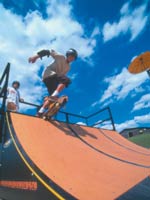

 To minimize the heat and noise problems, other skatepark equipment manufacturers have turned to a new paper-based surface called Skatelite Pro. Even ARC has a second product line consisting of steel plates covered by sheets of Skatelite. As one would suspect upon hearing it's made of paper rather than steel, the warranty on this surface isn't 20 years. Instead, it's only five years, which some manufacturers who have stuck with steel would say is still much too generous.
To minimize the heat and noise problems, other skatepark equipment manufacturers have turned to a new paper-based surface called Skatelite Pro. Even ARC has a second product line consisting of steel plates covered by sheets of Skatelite. As one would suspect upon hearing it's made of paper rather than steel, the warranty on this surface isn't 20 years. Instead, it's only five years, which some manufacturers who have stuck with steel would say is still much too generous.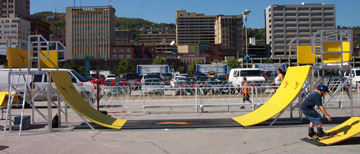 Meanwhile, SunRamp's wood-and-plastic skatepark components are roughly half the price of the galvanized steel skatepark ramps. Sabol said he can compete for the $10,000 to $20,000 skateparks that the big steel guys couldn't even bid upon. Plus, he can compete for contracts where the customer wants to be able to move pieces around or not make too permanent a commitment to a skatepark, for instance where a city might want to convert a parking lot into a skatepark for a few weeks or months (see photo above).
Meanwhile, SunRamp's wood-and-plastic skatepark components are roughly half the price of the galvanized steel skatepark ramps. Sabol said he can compete for the $10,000 to $20,000 skateparks that the big steel guys couldn't even bid upon. Plus, he can compete for contracts where the customer wants to be able to move pieces around or not make too permanent a commitment to a skatepark, for instance where a city might want to convert a parking lot into a skatepark for a few weeks or months (see photo above).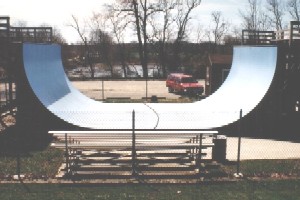 Mapp sent along a photo (seen here) of a skatepark he constructed in the spring of 1991, the
Mapp sent along a photo (seen here) of a skatepark he constructed in the spring of 1991, the 